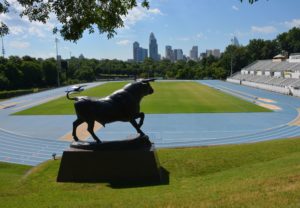 Johnson C. Smith University has been awarded three grants to visually reconstruct former African American neighborhoods, destroyed during urban renewal processes in Charlotte. JCSU’s team will work with Duke University’s Digital Humanities Lab to digitize parts of African American communities that were destroyed in the 1960s and 1970s in an augmented reality environment. The project will also trace the path of displaced families and institutions across the city, and parallels will be made with current threats of gentrification in the Historic West End neighborhoods around the university.
Johnson C. Smith University has been awarded three grants to visually reconstruct former African American neighborhoods, destroyed during urban renewal processes in Charlotte. JCSU’s team will work with Duke University’s Digital Humanities Lab to digitize parts of African American communities that were destroyed in the 1960s and 1970s in an augmented reality environment. The project will also trace the path of displaced families and institutions across the city, and parallels will be made with current threats of gentrification in the Historic West End neighborhoods around the university.
“To make the impact of urban renewal clear, it can be said that it is similar to the processes by which Native Americans were “removed” by those who coveted their lands,” said Dr. Tekla Johnson, Electronic Resources Librarian and pilot of this project. “African Americans have been removed from the locations where they settled as freepersons after the American Civil War. This pattern of removal is also analogous to the Bantustans or reserves which Africans in South Africa were restricted to under apartheid. This pattern of gentrification has occurred all across the United States, jeopardizing the financial stability of African American communities and impacting our economic well-being and even health in many cases. This project does not recover the land, but it does seek, to reconstruct a virtual sense of place, history, narrative, to illustrate the warmth and strengths of these African American communities and to reinforce African American culture.
The University was awarded $75,000 from the Knight Foundation, $38,000 from the National Parks Service, and $194,000 from the National Historical Publications and Records Commission (National Archives) for the three-phase project. Several large maps from the Charlotte Planning Commission that were used to document and justify the policies and progress of urban renewal in these supposedly “blighted” neighborhoods will be digitized with the help of the University at North Carolina at Charlotte in the first phase of the work. Community members from the affected neighborhoods will be approached for oral history interviews and input on what stories and narratives they want the project to tell, and the final phase of this two-year project will focus on the design and creation of reimagined neighborhoods in a virtual landscape in partnership with the Duke Digital Humanities Lab.
University Archivist and Digital Manager Brandon Lunsford, who will serve as co-pilot of this project with Johnson, said this project is critical to understanding some of the current institutional racism being addressed today.
“I think this project will be crucial to understanding how the machinery of institutional racism worked in Charlotte, as far as housing discrimination, forced dislocation, and highway construction,” Lunsford explained. “This happened all over the country but this will show how it played out in Charlotte. It will also show how Black communities are still under threat under a different guise, in this case gentrification as another form of resettlement.”
The project is part of the university’s continued efforts to raise awareness of Black history and share the narrative of African American’s impact in the Charlotte community.
